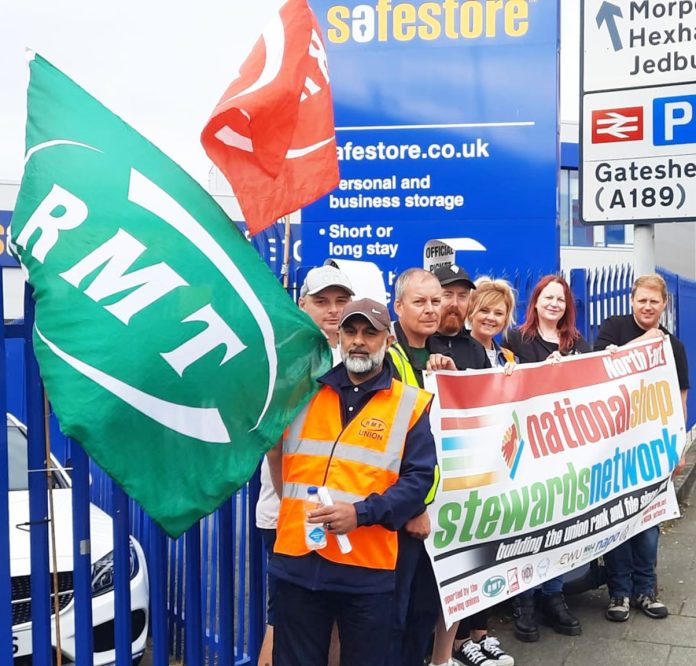Socialist Party members in the RMT
The dispute between RMT rail union and Network Rail is now officially over. But members must prepare for future battles.
After 20 days of strike action, along with limited, periodic overtime bans, 76% of members voted to accept Network Rail’s most recent offer. Our Train Operating Company (TOCs) members remain in dispute, but the strike action previously booked for 30 March and 1 April has been called off following a new offer from the employers.
Network Rail
The strike action forced employers to improve the original Network Rail offer. However, despite the majority on Network Rail voting to accept, there is clearly a significant number of members who are immensely disappointed with the outcome of a battle which commenced last June and, along with the Royal Mail postal workers, launched the current strike wave.
This accepted offer is only a slightly improved version of a previous offer which was rejected, as very strongly recommended by the National Executive Committee (NEC), as recently as December. However, this time the new offer, still a below-inflation pay rise and ending the national fight against Network Rail’s ‘Modernising Maintenance’ cuts agenda, was put to members without a recommendation.
It is clear from the referendum result that the majority of members felt that the deal was the best that could be achieved at the moment. This feeling would have been encouraged by the video for members fronted by Senior Assistant General Secretary Eddie Dempsey, which, although not explicitly recommending acceptance, presented the offer using tone and language which implied that it should be accepted.
This is despite National Maintenance Council reps having asked the NEC, only days beforehand, to put more strike action on at weekends.
Be prepared to fight modernisation
The result is undoubtedly a setback for Network Rail members, in particular for those on the maintenance side who will face the biggest attacks from ‘Modernising Maintenance’. Mick Lynch’s letter to members on 9 March argued that accepting the offer would mean ‘Modernising Maintenance’ couldn’t be resisted with industrial action.
However, the union has not signed up to the ‘modernisation’ programme and we must be prepared to go back into industrial dispute, using strike action if necessary, to fight attacks from management.
TOCs
It remains to be seen how the result will affect the TOC members. They are all still in dispute, but removing Network Rail from the national dispute does reduce the impact of having the majority of operational railway staff striking together.
At the time of writing, the NEC is considering a new offer from the employers, but once again it comprises a below-inflation 5% followed by 4%, tied to acceptance of a raft of very serious attacks on jobs, terms and conditions. This time this is to be negotiated through each separate TOC’s collective bargaining machinery, instead of one body representing them all.
RMT must reject any offer which involves paying for a pay rise by selling members’ jobs and conditions.
It is vital that the upcoming reballot of TOC members returns a massive ‘yes’ vote. The NEC should not use the Network Rail settlement as an excuse to dilute our previous demands for an inflation-proof pay rise for our TOC members and for terms and conditions to be protected.
A national meeting of reps from the TOCs should be called, along with special meetings of branches and regions, so that the campaign to defend our jobs, pay and conditions can be built.
The strike wave isn’t over. Over 600,000 workers took action together on Budget Day in the single biggest strike day yet. This included RMT and Aslef members on London Underground, who are fighting to defend their jobs, pay and pensions.
Nationalisation
The NEC must provide the leadership that is so urgently needed and not allow the government and rail bosses to get away with their agenda of making rail workers suffer to boost their profits.
We must fight for maximum coordination of action against the bosses and the Tory government, and raise the clear demand for socialist democratic nationalisation of the railways. If Keir Starmer were to commit an incoming Labour government to this now, the pressure on the bosses and Tories would be intensified.
A signaller says:
“In signalling and operations, there was much disappointment that a proposed overtime ban was twice called off. The signalling staff were shocked, as this would have had the company scrambling for cover, causing massive disruption without costing the members, and they believed that Network Rail was dreading this course of action.
“There was no meeting with area reps from Network Rail, whereby we could have appealed to the NEC to implement the overtime ban. Many from signalling chose to vote to accept when they realised their voices were being ignored, and the tactics were poor. That mistake should not happen again with the TOCs.”








